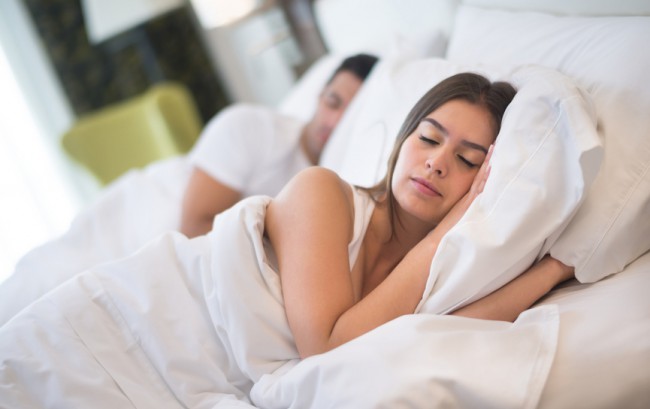If you’re not sleeping well enough at night, you’re not alone. Millions of Americans have trouble falling asleep, or staying asleep. According to the American Academy of Sleep Medicine, about 10 percent of adults suffer from a chronic sleep disorder. Insufficient sleep and insomnia can have profound effects on quality of life, academic and work performance, and health. Of course, over-the-counter aids are available, but these medications may come with unwanted side effects.
So what can you do to achieve a better night's rest? With a few lifestyle changes and natural remedies, you can start sleeping easier in no time.
Practice mindfulness meditation and yoga.
If done on a daily basis, meditation and yoga can help you quiet an overactive mind, and also assist with your body’s ability to develop brain wave patterns that are calmer and more centered. It’s important to be able to find ways to shift your nervous system from feeling like you’re always on the go (this stimulates what’s known as a “sympathetic nervous system” response), to feeling that you can easily drift off to dreamland (this stimulates what’s known as a “parasympathetic nervous system” response).
You can learn more about mindfulness meditation, and listen to free guided meditations, on UCLA’s Mindful Awareness Research Center site. To bring yoga right into your own home, consider Gaiam’s Rodney Yee’s Yoga DVD. You can follow his yoga instructions at your leisure and do his p.m. class right before bedtime to help you unwind after a long day. This should help you to drift effortlessly into sweet dreams without sleeping problems.
Soothe your senses with an aromatherapy bath before bedtime.
Try Aura Cacia Aromatherapy Meditation Mineral Bath, a lovely product that blends desert salts with essential oils to soften your skin and help calm your mood. It contains cedarwood oil, myrtle oil, sandalwood oil and patchouli oil.
Support your pineal gland.
Your pineal gland releases melatonin when it’s dark, thereby helping to regulate your sleep-wake cycles. Sensitive to light, the pineal gland doesn’t function optimally when lights are kept on late at night. To help your pineal gland do its job, begin to turn down the lights at 8 p.m.; this allows you to adjust your sleep-wake rhythm so that you can be in bed by 10 p.m. If you have to be up at 5 a.m., begin lowering the lights earlier than 8 p.m. If you live in a part of the world where the sun doesn’t go down until 9 p.m. or later during the summer months, wear a dark eye cover at night to optimize your sleep.
Avoid alcohol.
Researchers at the University of Missouri School of Medicine have shown that drinking alcohol regularly can disrupt quality of sleep. Although alcohol may assist some people in falling asleep, it may often cause people to wake up a few hours later and be unable get back to sleep in the middle of the night. In addition, alcohol acts as a diuretic, so it can cause a person have to use the bathroom earlier in the morning than if they didn’t consume alcohol.
Eat a healthy dinner.
When people skip dinner, they unfortunately force their bodies to jump through a number of hoops to keep their blood sugar under control. The brain is metabolically very active and uses about a third of all the blood sugar in the body at any one time.
If a person goes for long periods of time without eating, the body releases a stress hormone called cortisol. This hormone can convert stored sugar (glycogen) in the liver and muscles cells into a simple sugar (glucose) that can be used by the brain. This is how the body is able to go through long periods without eating regular food.
At times this can be an advantage, but this mechanism can go into overdrive when a person skips dinner, causing wakefulness in the middle of the night when cortisol levels peak. By simply eating a healthy dinner, you can help to ensure that your brain is getting the fuel it needs to function all night with normal cortisol release.




